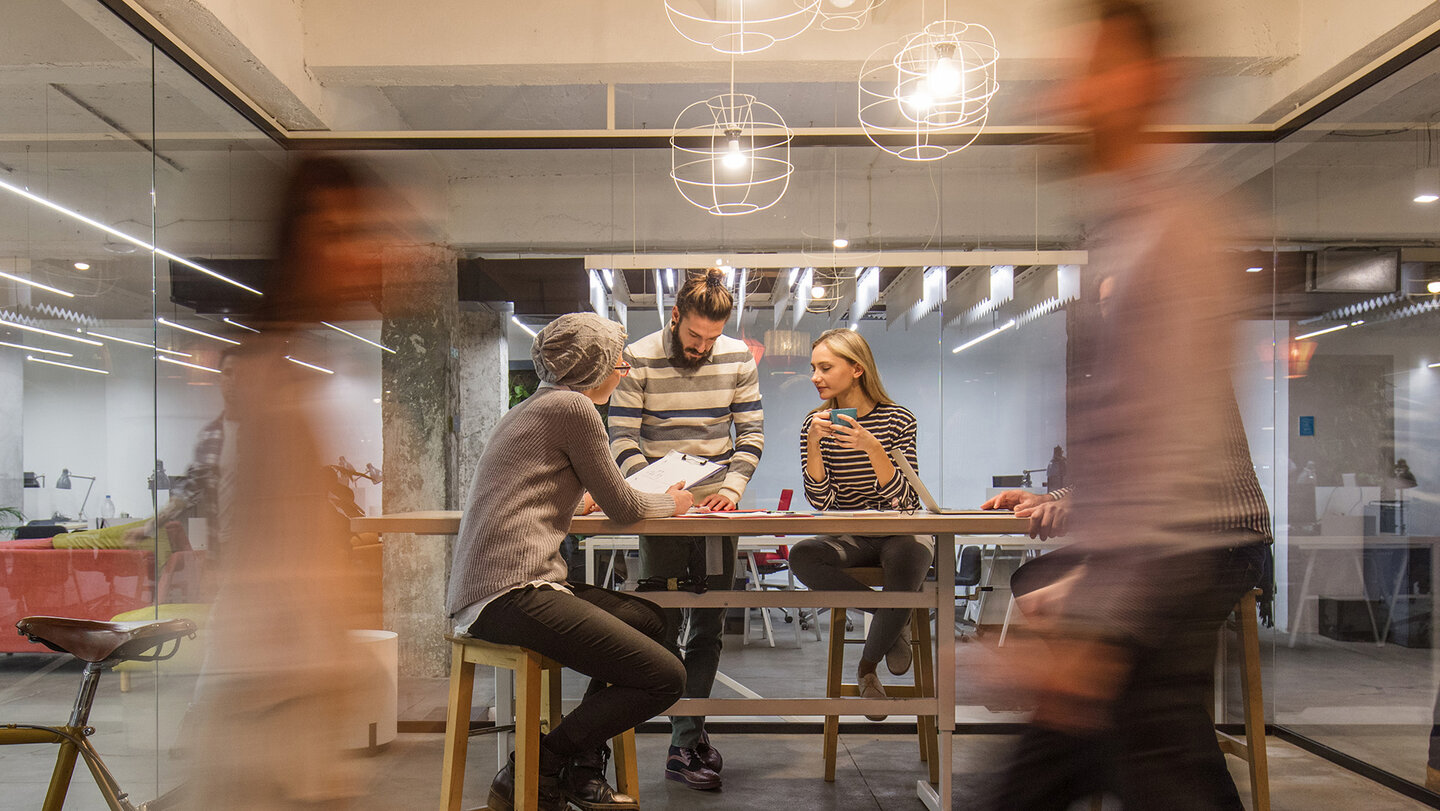In the coronavirus crisis, the home office is booming whilst the economy has collapsed. But don’t expect a long-term slump in the office real estate sector. Offices are still in demand but there’s a need to adapt to the new reality and ensure that your office still has pulling power – especially as the war for talent will no doubt continue once the coronavirus is over.
Von Harald Czycholl-Hoch, freelance business journalist
Desks and conference rooms have been abandoned, office chairs lie empty and the canteen is closed. At the height of the coronavirus pandemic, bustling office buildings turned into ghost towns practically overnight. When social distancing rules were applied, companies sent their employees to work from home and people communicated via online conferences, or by chat and email. Never before had so many people been simultaneously working from their home offices, yet, for the most part, the technology coped. Companies like Siemens have reacted by moving around 140,000 employees from a five to a two-day week in the office.
Will the coronavirus pandemic lead to the much-discussed ‘new normal’, where workers no longer commute into the office – collaborating with their colleagues virtually from their desks at home instead? And if so, will we even need these large, prestigious office buildings anymore? Real estate experts have long been chewing over these questions, yet there isn’t really any consensus. Some predict a long-term fall in demand for the office real estate market, with lower buy prices over the medium and long term and lower premium rents, while others expect a swift return to normal once the coronavirus crisis is over.
In reality, we’ll probably fall somewhere in the middle of these two extremes. There will surely be a greater amount of working from home, which will mean that demand for office space in the next few years won’t rise as steeply as it has done in the years before the crisis. This won’t spell out the end for office buildings but they will have to adapt to meet a new set of requirements.
The coronavirus pandemic will definitely affect the office real estate market – at least in the short term. “Coronavirus will be impacting the real estate economy and property companies over the next few years,” explains Klaus Hirt, who is based at the Frankfurt office of Drees & Sommer. The crisis hasn’t fully filtered through to the jobs market and construction projects yet. Current projects are still under way and new projects are being reviewed. Demand may potentially
be falling, but new spaces are still coming onto the market. That puts pressure on existing properties and could result in a rise in vacant properties and falling rents. If rents decrease, that could lead to an even larger collapse in prices since rent expectations are factored into purchase prices. It’s likely that Class B and C properties would be affected most, with average rents and prices becoming unsustainable.

Many workplaces can’t switch completely to working from home
According to analytics firm Realxdata, given the increasing popularity of the home or mobile office, no additional large office spaces are being bought or rented at the moment. However, it’s hard to imagine that working from home will completely supplant the office: “It could be challenging to put together new teams and onboard new employees from a distance,” predict analysts at Deutsche Bank. In addition, there will be a need for effective two-way communication between employers and employees directly after the coronavirus crisis.
“So we are only expecting sporadic increases in home-working for 2020, with no direct impact on the demand for office space.” Indeed, many workplaces can’t switch completely to working from home because of legal or regulatory requirements. In addition, surveys taken by employees have revealed that their health has suffered as a result of home working, especially because there is no clear separation between working hours and leisure time – and they miss the regular contact with their colleagues. There are also structural reasons that might get in the way of a large shift towards working from home, like Germany’s large manufacturing sector. The data shows that regions with a smaller manufacturing industry have higher numbers of people working from home. Compared with other EU countries, Germany has a slightly below-average proportion of home workers – a statistic that has remained very stable for the last 30 years. The proportion of people who work from home occasionally or regularly is about 12 per cent (the EU average is approximately 14 per cent). By contrast, most of Germany’s neighbouring countries have a higher number, with the Netherlands leading the way with 36 per cent.
If home working could potentially reduce the demand for office space, a more severe threat is the deep economic crisis that has been unleashed in Germany by the coronavirus pandemic. We have seen a substantial 12 percent contraction in the first two quarters of the year. The Institute for the World Economy in Kiel has published a prognosis for the whole of 2020 this summer that puts it at 6.8 per cent. This massive decline has not yet filtered through into the jobs market in Germany, but it may still do so. Short-time work and state aid have so far prevented mass redundancies in countries like the US, but experts predict a wave of insolvencies in the second half of the year, with a total loss of around a million jobs. When companies cease to exist or operate with a reduced headcount, demand for office space will fall swiftly.
More premium office spaces will be needed in future
Then again, perhaps it’s not that simple. After all, those employees returning to work might actually need more space because of social distancing measures. In offices with more cubicles, and larger offices with less densely packed desks and spare space, there will be a greater need for space. In other words, companies needing to change their office space may not necessarily be looking to downsize. “We’re going to need more premium office spaces in future,” explains Klaus Hirt, the Drees & Sommer office expert. “Only developers and proprietors who set themselves up properly and bring the right products to market will stand a chance of succeeding.” With the office facing renewed competition from the home office, it needs to be attractive enough so that workers prefer it to working from home. “The office of the future needs to be somewhere to meet people in person. It actually needs to be cooler than working from home, so that it’s a draw in its own right,” Klaus Hirt explains. After all, the much-talked-about war for talent will doubtless continue once the coronavirus subsides. Increasingly, it looks like that battle will be decided by nonmonetary factors such as how nice the office is. “It’s especially at times when there’s a lack of skilled workers that companies need to differentiate themselves from the competition,” Klaus Hirt continues. “If employers want to increase employee
loyalty and satisfaction, they need to channel their efforts into redesigning their office spaces.”
Brighter rooms, relaxation zones and personal climate control will become increasingly more important in future. Businesses will be able to retain their appeal by bringing in fresh ideas, such as allowing workers to come and go more freely and providing infrastructure that facilitates interaction and communication. This will become even more pressing when the economy recovers from the shock caused by the coronavirus. And potentially that could happen sooner than we think: The Institute for the World Economy estimates that the economy will grow by 6.3 per cent next year, which would largely offset the coronavirus losses.
Dossier "The Workplace Reloaded”

The corona pandemic has suddenly brought us face to face with issues – such as digitization and sustainability – that the construction sector would have had to address sooner or later anyway. Whilst it's clear that the office itself is still relevant, what will it actually look like?
What will characterize the offices of the future, which aspects will be important for the workplace in the future and for everyone connected with it, is the subject of numerous articles and interviews in our dossier "The Workplace Reloaded".